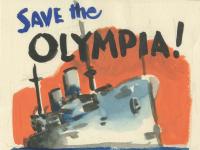Articles in the January 2019 PMHB explore Abraham Lincoln's swing state strategy, the work of "lady architect" Minerva Parker Nichols, and the preservation of the warship Olympia.
Contents
Articles
Abraham Lincoln's Swing State Strategy: Tariff Surrogates and the Pennsylvania Election of 1860
by Phillip W. Magness
"Lady Architect": The Work and Writings of Minerva Parker Nichols in Late Nineteenth-Century Philadelphia
by Margaret (Molly) Lester
"Save the Olympia!" Preserving Dewey's Flagship in Twentieth-Century Philadelphia
by Seth C. Bruggeman
Book Reviews
Grimes, The Western Delaware Indian Nation, 1730–1795: Warriors and Diplomats
by Heather Hatton
Anishanslin, Portrait of a Woman in Silk: Hidden Histories of the British Atlantic World
by Nicole Mahoney
Ireland, Sentiments of a British-American Woman: Esther DeBerdt Reed and the American Revolution
by Rachel Monroy
Furstenberg, When the United States Spoke French: Five Refugees Who Shaped a Nation
by R. William Weisberger
Rusert, Fugitive Science: Empiricism and Freedom in Early African American Culture
by Sean Morey Smith
Densmore, Faulkner, Hewitt, and Palmer, eds., Lucretia Mott Speaks: The Essential Speeches and Sermons
by Mary T. Freeman
Gross, Hannah Mary Tabbs and the Disembodied Torso: A Tale of Race, Sex, and Violence in America
by Carolyn Levy
Kelly, Power, and Cary, Hope in Hard Times: Norvelt and the Struggle for Community during the Great Depression
by Angela Shope Stiefbold
Cover image: Preservation flier painted by Henry Dexter Learned. Box 6, Henry Dexter Learned Papers, Special Collections Research Center, Temple University Libraries, Philadelphia, Pennsylvania. One of the founders of the Cruiser Olympia Association Inc., Temple University professor Henry Dexter Learned played a crucial role in the preservation of Admiral George Dewey’s flagship, now a familiar landmark at Penn’s Landing in Philadelphia. Far from inevitable, Olympia’s preservation saga intersected with evolving understandings of race, gender, and America’s place in the world. In “‘Save the Olympia!’ Preserving Dewey’s Flagship in Twentieth-Century Philadelphia,” Seth Bruggeman traces this story, connecting it to issues in twenty-first-century shipboard interpretation.


